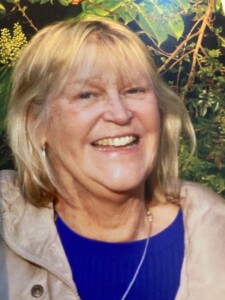 John Illman celebrates the life of Lindsay Knight, 1948-2023.
John Illman celebrates the life of Lindsay Knight, 1948-2023.
When the first edition of Lindsay Knight’s book, Talking To A Stranger: A Guide to Psychotherapy, was published in 1986, the innovative and highly acclaimed psychiatrist Robin Skynner called it “the best thing’ he’d seen on the subject”. It won the MIND (then the National Association for Mental Health) book of the year prize and an MJA award.
It was ahead of its time. In 1986 psychotherapy was widely perceived in the UK as a dangerous US import — something you didn’t own up to. Lindsay remembered a woman who left work early every Thursday. People speculated that she was having an affair. She was too embarrassed to explain that she was in therapy.
Lindsay later admitted to initial strong reservations of her own. She had planned to write the book without undergoing therapy. But she said: “Little did I realise that I had almost certainly wanted to write the book in order to give myself permission to undertake therapy — which I inevitably did soon after I began the research.”
Runaway success
The book’s runaway success led to Why Feeling Bad is Good: How Women Can Use Depression to Make Positive Changes in their Lives. Suffering from depression from “time to time”, as she put it, Lindsay believed that people should listen to, rather than ignore, their emotions. As MIND-OUT editor for three years, she saw many of the hundreds of letters to MIND by people seeking drug-free solutions for emotional distress.
Her books were based on painstaking, comprehensive research. Skynner, co-author with comedian John Cleese, of Families and How to Survive Them, described his interview with Lindsay for her first book. He noted “the range and depth of her understanding and the thoroughness with which she investigated aspects of the subject which were disputed or uncertain”.
Her understanding supplemented an ability to draw the best from interviewees, both practitioners and those who re-lived their pain to talk to her. Lindsay was able, quietly, to identify with debilitating problems, putting people at ease. It helped that she was a people-person with great charm masking a considerable intellect and inquisitiveness.
Throwing herself into social life with the same kind of whole-hearted commitment, she loved parties, especially throwing them. Many friends’ abiding memories of Lindsay will be of her with a glass of wine in one hand and a serving spoon in the other. Guests at her 1997 election night party were asked to bring food the colour of all the parties — the fare included blue crisps. (She favoured red).
Precociously bright
One of two children of Philip Knight, a head postmaster, and his wife, Dorothy, a medical secretary, Lindsay was precociously bright. Attending three north-west secondary schools, she took the eleven-plus a year early and O and A levels two years early before completing Oxbridge entry exams at Bolton School, Lancashire. As a child she developed a life long passion for reading. She was part of a loving family, including her brother Andrew, a public art and design consultant curator.
After reading English at St Anne’s College, Oxford, she worked on the Hertfordshire Express, The New Internationalist and New Society before joining what is now MIND.
Writing was her great strength, but in 1982, she cast a speculative eye towards the newly formed and highly fashionable Channel 4 (C4) which described itself as “a disruptive, innovative force” — a promise of great appeal to Lindsay.
She spent the next 12 years mainly in TV, firstly as a producer (1982-1986) of Well Being, a C4 series about topics such as depression, diabetes, social inequality and alcoholism. Her many TV credits included Cities Fit to Live In, an international C4 co-production.
International consultant
Starting in 2002, she worked as a writer, editor and consultant for international NGOs, including UNAIDS, UNICEF, the World Health Organisation and the International Federation of Red Cross and Red Crescent Societies.
In 2003 she met Professor George Irvin (“the love of my life”) at a dinner party in Brighton. He had spent 25 years at the International Institute of Social Studies, The Hague. Leaving in 2001, he later joined the School of Oriental and African Studies, London University, working on world trade and financial flows and EU economies.
Enjoying ‘a wonderful life’ together’ in the words of a friend, they travelled extensively before George developed progressive supranuclear palsy (PSP). Caused by the build-up in the brain of the protein tau, it can affect balance, movement, vision and speech.
Speaking at Lindsay’s funeral ceremony, Sue Davidson, an old friend, said: “The situation became more complex when Covid intervened in all of our lives. Lindsay did her best to look after George with a team of people. But like everyone at that stage, their world became much smaller.”
Lindsay has left her many friends, including me, with many good memories, in particular about her sense of fun and love of shopping. Vivien Goldsmith, former features editor on Sunday Business, who knew her for around 50 years, said: “I commissioned her to go on a cruise to Spain and North Africa. It gave her shopping gene full rein to buy a mass of bulky things — things you wouldn’t have been able to car home on a plane. There were ceramics, multi-coloured glassware and pots — she loved seeing different cultures and had a great sense of adventure.’’



Recent Comments